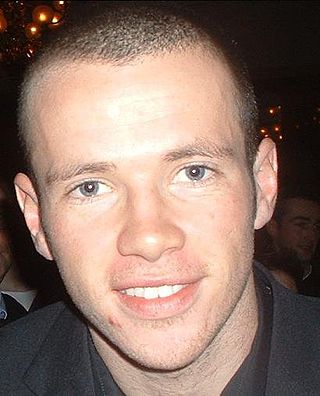Related Research Articles
Allan Moore is a Scottish football player and manager and is currently the manager of Camelon Juniors.
Peter Ian Ronald MacDonald is a Scottish former professional football player and coach, who last played as a striker for East Stirlingshire.
David William Hutton is a Scottish professional footballer who plays as a goalkeeper for Scottish Championship club Airdrieonians. Hutton has previously played for Aberdeen, Petershill, Clyde, Queen of the South, Hamilton Academical, Greenock Morton, Ayr United, Dunfermline Athletic, Arbroath, Brechin City and Alloa Athletic.

Edward Joseph "Eddie" Malone, is a Scottish association football player, who plays for East Stirlingshire.
Christopher Aitken is a Scottish retired footballer and most recently manager of Kilwinning Rangers.
The 2010–11 season was Dumbarton's second consecutive season in the Scottish Second Division, having been promoted from the Scottish Third Division at the end of the 2008–09 season. Dumbarton also competed in the Challenge Cup, League Cup and the Scottish Cup.

The Scottish Championship, known as the William Hill Championship for sponsorship reasons, is the second tier of the Scottish Professional Football League, the league competition for men's professional football clubs in Scotland. The Scottish Championship was established in July 2013, after the Scottish Professional Football League was formed by a merger of the Scottish Premier League and Scottish Football League.
Season 2014–15 saw Greenock Morton compete in the Scottish League One the third tier of Scottish football, having finished bottom of the Scottish Championship in 2013-14. Morton will also compete in the Challenge Cup, Scottish League Cup and the Scottish Cup.
The 2014–15 season was Ayr United's 2nd season in League One and their 3rd consecutive season in the third-tier of Scottish football. Ayr also competed in the Scottish Cup, League Cup and the Challenge Cup.
Season 2015–16 saw Greenock Morton compete in the Scottish Championship the second tier of Scottish football, having finished top of the Scottish League One in 2014-15. Morton also competed in the Challenge Cup, Scottish League Cup and the Scottish Cup.
The 2016–17 Scottish Championship is the 23rd season in the current format of 10 teams in the second tier of Scottish football. The fixtures were published on 17 June 2016.
The 2016–17 season was Dunfermline Athletic's first season in the Scottish Championship, having finished top of the Scottish League One in 2015–16. The Pars were relegated from the competition's previous incarnation, the Scottish First Division at the end of the 2012–13 season.
Season 2016–17 saw Greenock Morton compete in the Scottish Championship the second tier of Scottish football, having finished fifth in 2015-16. Morton also competed in the Challenge Cup, Scottish League Cup and the Scottish Cup.
The 2016–17 season was Ayr United's 107th season of competitive football and their first season back in the second tier of Scottish football, now known as the Championship. Ayr also competed in the League Cup, Scottish Cup and the Challenge Cup.
The 2017–18 Scottish Championship was the 24th season in the current format of 10 teams in the second tier of Scottish football. The fixtures were published on 23 June 2017.
The 2017–18 season was Dunfermline Athletic's second season in the Scottish Championship, having finished 5th in the 2016–17 season.
The 2018–19 Scottish Championship was the 25th season in the current format of 10 teams in the second tier of Scottish football. The fixtures were published on 15 June 2018, with the league starting on 4 August 2018.
The 2016–17 season was Falkirk's fourth season in the Scottish Championship and their sixth consecutive season in the second-tier of Scottish football following their relegation from the Scottish Premier League at the end of the 2009–10 season. Falkirk also competed in the Challenge Cup, League Cup and the Scottish Cup.
The 2017–18 season was Falkirk’s fifth season in the Scottish Championship and their seventh consecutive season in the second-tier of Scottish football following their relegation from the Scottish Premier League at the end of the 2009–10 season. Falkirk also competed in the League Cup, Challenge Cup and the Scottish Cup.
References
- ↑ "Jim Duffy". fitbastats.com. Retrieved 11 October 2012.
- ↑ Charlie Nicholas and Jim Duffy return to childhood home in Wyndford to launch housing investment, Evening Times, 25 March 2016
- ↑ Liverpool's Andy Robertson: The people & places behind Scotland defender's rise, BBC Sport, 30 May 2019
- ↑ "Falkirk FC Managers". Archived from the original on 13 March 2012. Retrieved 28 July 2011.
- ↑ "Dundee go for Duffy" BBC Sport (4 July 2002)
- ↑ "Dundee keep faith in boss Duffy" BBC Sport (26 May 2005)
- ↑ "Dundee move to sack manager Duffy" BBC Sport (25 August 2005)
- ↑ Gordon, Phil. Duffy promoted over Rix in the latest Tynecastle reshuffle [ dead link ], The Times , 14 February 2006.
- ↑ Roberts, Chris. Rix and Duffy are sacked by Hearts, The Independent , 23 March 2006.
- ↑ "Livermore goes as Duffy takes post". 9 February 2007. Archived from the original on 28 September 2007. Retrieved 10 October 2007.
- ↑ "Duffy confirmed as Brechin boss". BBC Sport. 9 January 2009.
- ↑ "Jim Duffy resigns as Brechin City manager". BBC Sport. 19 May 2010. Retrieved 19 May 2010.
- ↑ "Jim Duffy Appointed". Clyde F.C. 6 February 2011. Retrieved 6 February 2011.
- ↑ Chic Joins Clyde Clyde FC. 08-02-2011. 16-04-2014.
- ↑ "Jim Duffy appointed permanent Clyde manager". BBC Sport. 29 April 2011. Retrieved 29 April 2011.
- ↑ Duffy Appointed Clyde FC. 28-04-2011. 08-05-2015.
- ↑ Spiers on Saturday: meeting Jim Duffy, a survivor of many clubs Herald Scotland. 30-11-2013. Retrieved 16-04-2014.
- ↑ "Manager Jim Duffy joins Clyde board". BBC Sport. 1 February 2012. Retrieved 12 February 2012.
- ↑ Montrose 5–0 Clyde Clyde FC. 06-05-2012. Retrieved 08-05-2015.
- ↑ Clyde 1-2 Stirling Albion Clyde FC. 04-05-2014. Retrieved 08-05-2015.
- ↑ Nairn County 3-2 Clyde Clyde FC. 06-10-2012. Retrieved 08-05-2015.
- ↑ League 2 Manager of the Month Archived 18 May 2015 at the Wayback Machine spfl.co.uk. 15-11-2013. Retrieved 22-12-2013.
- ↑ Clyde FC results 2013-14 Clyde FC. Retrieved 08-05-2015.
- ↑ Clyde 1–3 Peterhead Clyde FC. 07-12-2013. Retrieved 16-04-2014.
- ↑ Clyde 4–0 Albion Rovers Clyde FC. 26-04-2014. Retrieved 08-05-2015.
- ↑ East Fife 2–1 Clyde (2–2 agg; East Fife win 7–6 on pens BBC Sport. 10-05-2014. Retrieved 08-05-2015.
- 1 2 "Jim Duffy leaves Clyde to 'join Morton as manager'". BBC Sport. 19 May 2014. Retrieved 19 May 2014.
- ↑ Mitchell, Jonathan (20 May 2014). "Duffy wants to bring back glory days to Cappielow". Greenock Telegraph. Retrieved 20 May 2014.
- ↑ Greenock Morton 1–0 Spartans BBC Sport. 26-07-2014. Retrieved 08-05-2015.
- ↑ Duffy wins League One award Archived 30 April 2018 at the Wayback Machine SPFL. 09-12-2014. Retrieved 08-05-2015.
- ↑ Spartans 2–1 Greenock Morton BBC Sport. 29-11-2014. Retrieved 08-05-2015.
- ↑ Spartans 2–0 Clyde BBC Sport. 01-11-2014. Retrieved 08-05-2015.
- ↑ Greenock Morton 3–1 Peterhead BBC Sport. 02-05-2015. Retrieved 08-05-2015.
- ↑ Jim Duffy salutes players after Morton win title Scotsman. 03-05-2015. Retrieved 08-05-2015.
- ↑ Mitchell, Jonathan (30 April 2016). "Morton manager signs two-year deal". Greenock Telegraph. Retrieved 30 April 2016.
- 1 2 Mitchell, Jonathan (16 November 2016). "Duffy shares credit for award with staff and squad". Greenock Morton F.C. Archived from the original on 17 November 2016. Retrieved 16 November 2016.
- 1 2 Burns, Cheri (4 May 2017). "Celtic gaffer Brendan Rodgers up against three rivals for PFA Scotland Manager of the Year award". Daily Record. Glasgow. Retrieved 4 May 2017.
- 1 2 Mitchell, Jonathan (25 May 2013). "Duffy named Championship manager of the season". Greenock Morton F.C. Archived from the original on 29 April 2018. Retrieved 25 May 2013.
- ↑ "Greenock Morton and Jim Duffy part company". Greenock Morton FC. 29 April 2018. Archived from the original on 12 August 2020. Retrieved 29 April 2018.
- ↑ Galloway, Andy (21 October 2018). "JIM DUFFY IS NEW DUMBARTON MANAGER". Dumbarton Football Club.
- ↑ Galloway, Andy (27 October 2018). "Dumbarton (4) v East Fife (0)". Dumbarton Football Club.
- ↑ "Jim Duffy steps down as Dumbarton manager". BBC Sport. 24 May 2021. Retrieved 24 May 2021.
- ↑ "Ayr United: David Hopkin leaves as manager after six months". BBC Sport. 9 September 2021. Retrieved 9 September 2021.
- ↑ "Ayr United appoint Jim Duffy as Manager". Ayr United FC. 1 October 2021. Archived from the original on 11 November 2021. Retrieved 1 October 2021.
- ↑ "Ayr United Announces the Departure of Jim Duffy & John Joyce". Ayr United FC. Retrieved 20 December 2021.
- ↑ "Club Statement: Managerial Appointment". Clyde F.C. 7 November 2022. Retrieved 7 November 2022.
- ↑ "Clyde 1-2 Annan Athletic (2-5 on aggregate): Galabank side earn first League promotion". BBC Sport. 19 May 2023. Retrieved 20 May 2023.
- ↑ "Jim moves to Director of Football role". Clyde F.C. 24 May 2023. Retrieved 24 May 2023.
- ↑ "Club Statement". Clyde FC. 18 August 2023. Retrieved 18 August 2023.
- ↑ "Clyde: Jim Duffy leaves role as director of football". BBC Sport. 18 August 2023. Retrieved 18 August 2023.
- ↑ "Jim Duffy: Dumbarton boss recovering in hospital after heart attack". BBC Sport. 24 June 2020. Retrieved 24 June 2020.
- 1 2 SPFL Monthly Awards Archived 26 October 2014 at the Wayback Machine SPFL. Retrieved 08-05-2015.